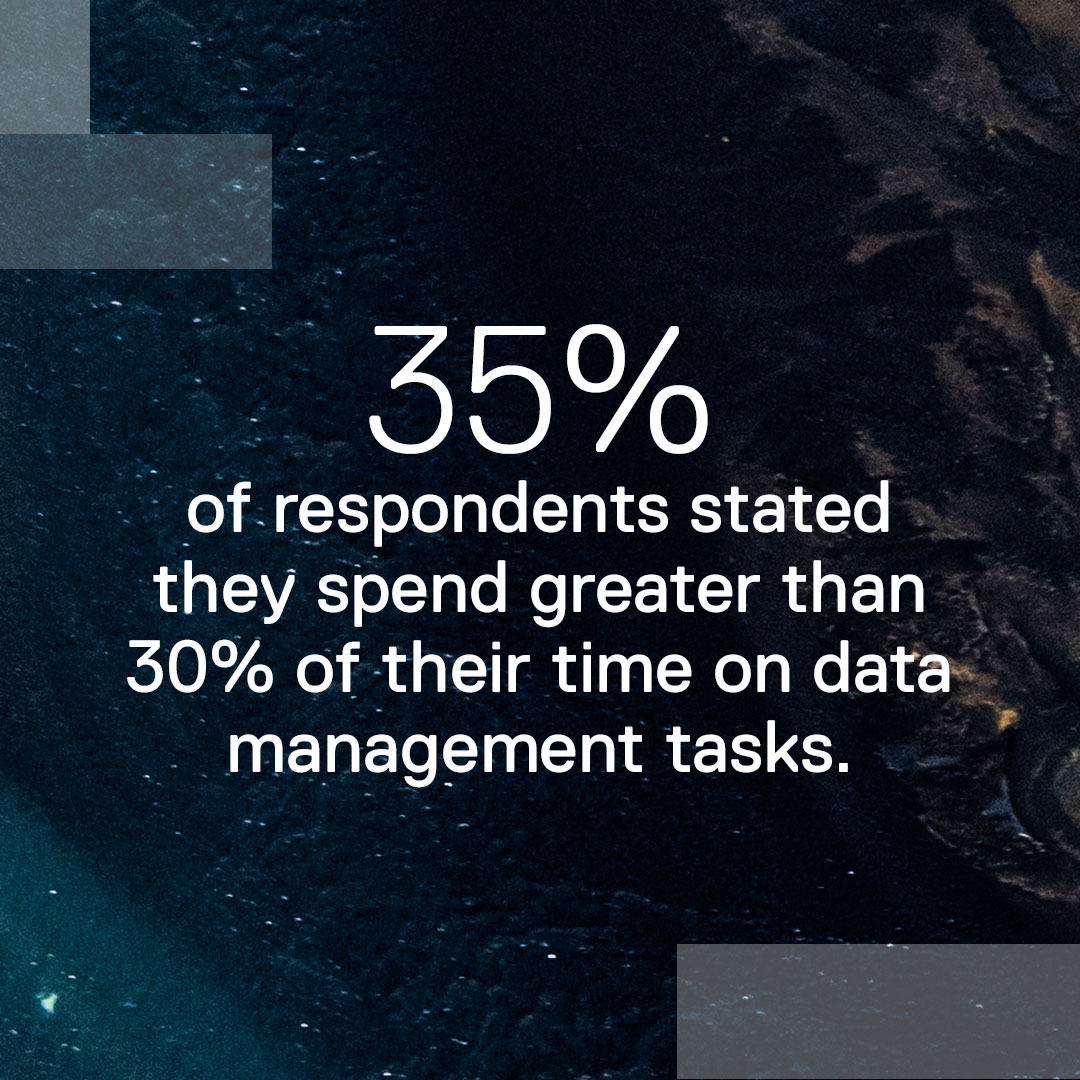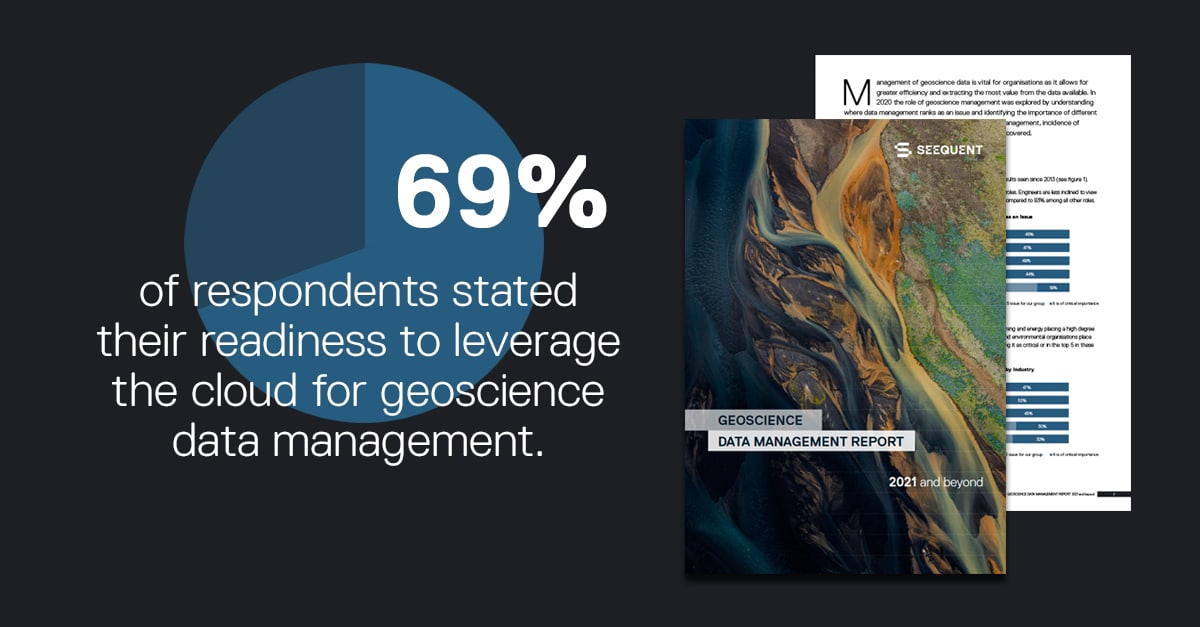Geoscience data underpins every critical business decision we make, but managing it efficiently and productively remains a challenge for companies across the globe. Why should that be?
Some of the answers are in our latest Geoscience Data Management Report, (a regular piece of research Seequent has been producing since 2011).
It’s one of the only studies of its kind to speak directly to geoscience specialists about the data issues they encounter every day, and what helps or hinders them in turning that hard-won information into business opportunities and bottom line value.
Last year we expanded the survey to reach geo-professionals across the mining, civil infrastructure, energy, environment and education sectors. The survey drew 709 responses from 320 organisations in 91 countries.

In 2021 those experts continue to tell us that managing geoscience data effectively is vital to them and the companies they work for. In fact 83% said it was a critical issue for their organisation. Yet they also told us it endures as one of the biggest obstacles they face to doing the job they need to do.
- Respondents admit that more than 30% of their time is still swallowed by data management related tasks
- They feel no more confident about managing data quantity and quality than they did five years ago
- 40% say version control continues to be their biggest headache when collaborating on active project data (even though powerful solutions exist to help)
- Businesses struggle with creating proper data frameworks to handle even their most valuable information. Nearly a quarter have no framework at all
- For some, workplace culture and the perceived complexity of change are creating formidable barriers to digital transformation and the ability of their business to grow.
To read the full version of our report and what it reveals about the journey to better data management go here.
Stuck in a digital timeloop
Here at Seequent we were expecting to witness more movement in this area, especially following recent advances in cloud technology, hardware capability and the increased adoption of collaboration platforms. Yet the same data challenges persist that we have seen in several reports now. Which prompted us to ask why.

It seems that even though cloud solutions have blossomed in the last five years, adoption among the sectors we surveyed has demonstrated only a slight uptick in that time. Interestingly, the proportion of respondents poised to embrace the Cloud has surged – now 69% which has increased 14% since 2017. Yet they remain stuck on the brink, not yet ready to take a step that should solve many of their data management dilemmas.
Certainly, security remains a concern; 60% rank data security and confidentiality as highly important to their organisation. Yet worries over cloud safety have, with good reason, been falling in recent surveys (even if apprehension about performance and cost have been increasing). So nervousness over the security of data wouldn’t appear to be the hurdle it once was.
Perhaps the answer lies elsewhere, so for the first time we also asked users about their data frameworks, as well as their processes and workflows for managing data.
The spirit is willing, but the foundations are weak
Only 30% of respondents said they had an established data management framework. Most reported using multiple systems, and nearly a quarter told us they had no framework at all. Meanwhile, one of the greatest challenges identified in trying to implement new data solutions was shown to be workplace culture and the perceived complexity of change. Resourcing and time have taken a back seat to the more challenging problem of change resistance.
Essentially, digital transformation can be scary. When decades of legacy systems and processes exist, and when teams are widely dispersed or isolated in silos, the potential disruption that needs to be managed is considerable. Yet without transformation, businesses cannot develop and grow.
And while this year’s survey shows there has been precious little change in how the industries we serve store their data – over half of businesses still manage files across a number of servers – the desire from their experts and geoscientists for an easily accessible ‘single source of truth’ has all but doubled in the three years since 2017’s survey. Cloud access, from anywhere in the world, is also seen as vital to the collaboration that helps drive businesses forwards. Perhaps the reason 40% of respondents rated a lack of version control as their biggest collaboration complication – a problem quickly solved when data is managed from a single, central source.
In conclusion
Our latest Geoscience Data Management Report shows that the challenges our industries face are fractured and complex – from culture and resources to cost and security.
But extracting the maximum value from available data is not just a primary objective for most organisations, it could hold the answer to everything from future growth and prosperity to project safety, successful exploration and fulfilling environmental responsibilities.
If you want to accelerate your journey to data management maturity, Seequent can help you map out a clear, collaborative and decision-centred path. We’ll take you – and your data – from complexity to clarity.
Read the full version of Seequent’s free Geoscience Data Management Report here.
To read how a simplified decision-making model can clear the path to data management best practice – read our follow up article ‘From data complexity to decision clarity’.





